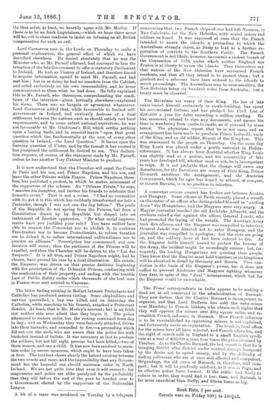Lord Carnarvon rose in the Lords on Thursday to make
a personal explanation, the general effect of which we have described elsewhere. He denied absolutely that he was the Minister who, as Mr. Parnell affirmed, had conveyed to him the intention of the late Government to offer a statutory Parliament to Ireland. He had, as Viceroy of Ireland, and therefore bound to acquire information, agreed to meet Mr. Parnell, and had met him ; but in so doing he had no mandate from the Cabinet, and acted exclusively on his own responsibility, and he never communicated to them what he had done. He fully explained this to Mr. Parnell, who thereupon, comprehending the condi- tions of the interview—given textually elsewhere—explained his views. There was no bargain or agreement whatsoever. Lord Carnarvon added that, while favourable to limited self- government in Ireland, and anxiously desirous of a final settlement between the nations such as should satisfy real local requirements, and to some extent national aspirations, he was not favourable to Mr. Gladstone's Bill, which settles nothing upon a lasting basis, and in especial leaves "open that great question whieh lies fundamentally at the root of every other question in Ireland,—the Land Question." It leaves open the burning question of Ulster, and by the tumult it has excited it has postponed the settlement he desired to see. This declara- tion disposes, of course, of the statement made by Mr. Parnell, unless he has another Tory Cabinet Minister to produce.


































 Previous page
Previous page